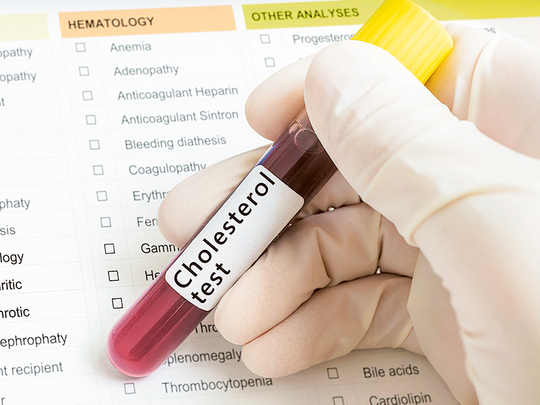
Dubai: Let’s start with the basics.
Cardiovascular diseases (CVD) are the foremost cause of fatalities in the UAE. While the international average age of CVD onset is 65, in the UAE it is 45.
This means UAE residents need to take care of their heart health earlier than the rest of the world.
At the heart of CVD is a major component we are all familiar with but not entirely knowledgeable of: cholesterol.
Cholesterol is a major contributor to heart disease. There is no argument about that. Is this a blanket warning? Not entirely. It is merely the beginning of developing a true understanding of what is cholesterol and how it affects our heart health.
First of all, here is a truth about cholesterol not everyone is aware of: cholesterol is a naturally occurring element in our body. Our body manufactures its own cholesterol.
Why? Because it is a vital element for many physiological functions.
Dr Abdullah Shehab, Associate Professor and Consultant, Cardiovascular Medicine, Clinical Pharmacology and Medical Education at UAE University, explains: “Cholesterol is essential for the formation of cell membranes and the manufacture of several hormones.”
But, and here comes the surprise, cholesterol is not required from the diet because the human liver produces all the cholesterol the body requires.
Which brings us to the next obvious question: what happens to the cholesterol we put into our body that comes from the food we eat?
Well, that’s where some explanations are required.
Professor Kaushik Kumar Ray, Professor of Public Health at the Department of Public Health and Primary Care, Imperial College London, said cholesterol per se was not the problem. “Cholesterol is needed for cells to grow and for normal hormone production. Too much narrows blood vessels, causing heart attacks and strokes. More than 99 per cent of doctors believe this to be the problem.”
Dr Yahya Kiwan, Consultant Interventional Cardiologist at Canadian Specialist Hospital, Dubai, says, “Most of the high cholesterol in the body is related to deficiency of enzyme in the liver which normally causes breakdown of cholesterol; however, some part is played by excessive intake of rich food.”
The issue of excess cholesterol in the body has many facets and its levels in the body can be dictated by hereditary tendencies, genetic imprint or lifestyle choices.
Hereditary influences
Hyperlipidemia (or high cholesterol levels) can be genetic wherein people inherit the disorder where the liver cannot remove cholesterol from the blood. In many cases, the liver overproduces ‘bad’ cholesterol which could be triggered by other conditions such as diabetes and obesity.
People are diagnosed as suffering from hyperlipidemia or high cholesterol issues when they have collective disorders that are characterised by abnormally high levels of lipids (fats) in the blood. While fats play a vital role in the body’s metabolic processes, high blood levels of fats increase the risk of coronary heart disease (CHD). Hyperlipidemia narrows blood vessels with plaque, just the way scum narrows the flow of water inside a pipe. When plaque accumulates and increases, it results in arterial hardening. Sometimes, this thickened plaque turns unstable and results in a flaking that leads to a blood clot forming on the arterial wall, blocking the flow of blood in the blood vessel. The resultant lack of oxygen being delivered to cells leads to death of tissue in heart, brain, etc.
Dr Shehab explained: “[One form] of hyperlipidemia is hypercholesterolaemia which is due to hereditary causes [wherein the individual has a tendency to have high cholesterol levels in his body]. Because hypercholesterolaemia causes no symptoms, preventive measures and regular measurement of cholesterol levels are important for people in high-risk categories. If blood cholesterol levels are elevated, large amounts of LDL (so-called “bad”) cholesterol can deposit in the arterial walls. These deposits represent the first stage in the narrowing of arteries, termed atherosclerosis. Left untreated, hypercholesterolaemia can eventually lead to a heart attack due to CHD or a stroke due to narrowed arteries supplying the brain.”
Lifestyle factors
In 2013, Rashid Hospital, Dubai, reported nearly 850 cases of patients diagnosed with CVD, of which 40 per cent had diabetes, 45 per cent had hypertension and nearly 25 per cent had high cholesterol or hyperlipidemia. It is a known fact that high levels of cholesterol are a precursor to obesity and hypertension both of which exacerbate diabetes.
Dr Janaradhan Rao, a specialist cardiologist from Aster Clinic in Al Ghusais, pointed out that nearly 80 per cent of his patients have obesity issues and suffer from metabolic syndrome and began having higher levels of cholesterol from the age of 30, putting them at higher risk of CVD.
Dr Ray said cholesterol per se was not the problem. “Cholesterol is needed for cells to grow and for normal hormone production. Too much [of it] narrows blood vessels causing heart attacks and strokes. More than 99 per cent of doctors [worldwide] believe this to be the problem.”












